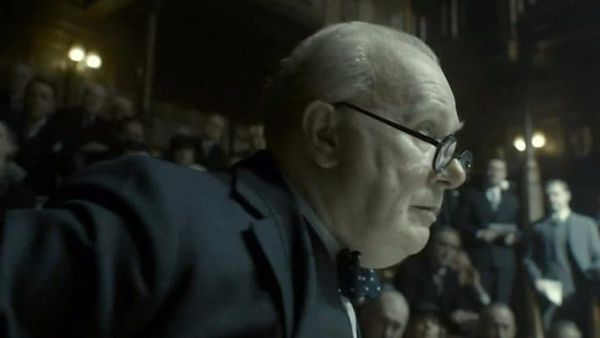Eye For Film >> Movies >> Darkest Hour (2017) Film Review
Darkest Hour
Reviewed by: Jennie Kermode

It's difficult to embody a figure so well known and so thoroughly mythologised as Winston Churchill, especially just months after somebody else has done it. Should one aim for realism or something more recognisable? Does dwelling on his darker deeds risk obscuring his achievements; does making light of his character obscure his sins; and does any such potrayal risk playing too much into the great man theory of history when the reality was much more complex, even haphazard? Here, Gary Oldman works hard to portray a difficult man as likeable. The audience is given room to warm to him. It's less clear, however, that the actor has, leaving a hollowness at the core of the film that is actually one of its strengths.
This portrayal is much more limited chronologically than Brian Cox's. We meet Oldman's Churchill just as he is about to become Prime Minister and follow him through the crucial days when he had to come up with a response to the suggestion of a truce with Hitler's Germany. Oldman gives us bluster and brutishness that recalls his pre-Batman Begins days as an actor, when he was all ego with zero finesse, but hammy as it is, it's not entirely inappropriate for the role. It positions Churchill as a man who is at ease when performing (his speeches are sufficiently impassioned, but who, behind the scenes, is constantly worrying about whether anyone actually likes or agrees with him. A twee scene in which he chats to members of the public in a railway carriage rather overplays this (and papers over his racism) but elsewhere the film is more balanced, especially in scenes with the always reliable Kristin Scott Thomas, who hides her beauty but amps up the elegance as his diligently conciliatory wife.

Much of the story is seen through the eyes of Elizabeth (Lily James), a young secretary who arrives on the scene just as normal politics is being abandoned and a war cabinet established. At first terrified by Churchill, she gradually befriends him, winning his respect as she reveals first her spirit and then her personal stake in the war. There are echoes here of Alexandra Maria Lara's role in Downfall, and additional parallels in the shooting of scenes in the map room means the two films would make an interesting double bill. James is good, with a lightness about her that prevents the film as a whole from becoming too grim or depending too heavily on its sometimes clumsy moments of humour.
Also interesting here is Ben Mendelsohn as an awkward King George whose disinterest in ceremony shows not only a recognition of the urgency of the decisions at hand but also an alertness to what the wider pattern of unrest across Europe might mean for his own position. His scenes with Oldman hint at the challenges of making the centuries old machinery of state fit for these new challenges, and both characters are connected by an obligation to set aside their humanity for the sake of duty. Anthony McCarten's script does not allow us to forget that men were left to die as a result.
There is an awkward balance here between the focus on capturing real events and a clear desire to play to the gallery, to rouse the spirits with a tale of courage duly summoned up on the long road to victory. Ultimately the film over-romanticises its subject and, in so doing, fails to illuminate the real complexities of this pivotal moment in social and political history.
Reviewed on: 15 Dec 2017
















